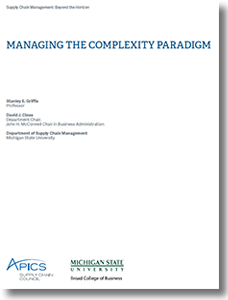APICS, and Michigan State University (MSU), recently announced findings from their latest report, “Managing the Complexity Paradigm.” The new report addresses the increased complexity of today's supply chain flow, which supply chain leaders cite as the top challenge they face. Omnichannel marketing has opened several new flows to the marketplace (direct from manufacturer, through distributors, and direct to home), and consumers are looking for more customized products.
The report discusses the balance between managing complexity that can increase cost but also has the potential to increase revenue. This is the fourth report released in APICS and MSU's Beyond the Horizon research project, which aims to identify and provide solutions to the most pressing issues facing supply chain managers.
“The partnership between MSU and APICS enables us to gain insights into the needs of supply chain professionals and their employers and provide them with content that solves real-world problems,” said APICS CEO Abe Eshkenazi, CSCP, CPA, CAE. “The newest Beyond the Horizon report provides individuals and organizations with meaningful research around supply chain complexity, a framework for understanding its drivers, and insights into how to effectively manage it.”
“I found it particularly interesting that a strategy some supply chain managers are taking to manage complexity is to avoid it altogether,” said APICS CEO Abe Eshkenazi, CSCP, CPA, CAE. “Many aspects of complexity are unavoidable and, as discussed in the report, an increase in demand for customization, more globalized operations, and expanding supplier networks require supply chain partners to embrace collaboration and maintain strong relationships to manage, and if possible, reduce complexity. Complexity isn't going away and supply chain leaders need to adapt to what we can't avoid. We need to work together as an industry to evolve with the increasingly complex supply chain landscape.”
“While we had studied complexity from a number of perspectives prior to this research, the interviews, surveys, and case studies that informed this report allowed us to develop a more comprehensive framework of what drives complexity and the different approaches to manage it,” said Dr. David J. Closs, the John H. McConnell Chaired Professor of Business Administration in the Department of Supply Chain Management at Michigan State University. “When we began the research, we were particularly surprised to learn that many firms didn't have a strong understanding of omni-channel. By the second year of the project, we found that firms had realized the growing demand of home delivery and were quickly incorporating omni-channel strategy to compete with companies like Amazon.”
Moving forward, MSU plans to conduct further research into defining the value chain as an expanded view of omni-channel that will include external partners. They are also investigating topics surrounding talent management, sustainability, and sensing as they relate to the supply chain.
For this report, APICS and MSU gathered data via comprehensive interviews with 50 global supply chain firms. The research found that firms are experiencing increased complexity due to a constantly growing number of products, customers, channels, and geographies. The four primary sources of supply chain complexity are summarized as:
1 Customer Accommodation: Customers expect ever-increasing speed and visibility of process, and variety and customization of products.
2 Operations Globalization: As supply chains expand into more varied global customer markets, substantial variations in existing supply chain processes must occur.
3 Supplier Complexity: Globalization means developing and maintaining strategies to overcome the complex and often serious issues associated with local sourcing.
4 General Business and Supply Chain Trends: The industry push to omnichannel supply chains is exacerbated by day-to-day business concerns, like technology turnover or company mergers.
In addition to investigating the nature of complexity-related issues affecting supply chains, the researchers also asked study participants how they were tackling complexity in the supply chain flow. Finding ways to avoid and preemptively mitigate complexity was the leading strategy reported, as well as relying upon collaborative partnerships, integrating modern information technology, engaging leadership and establishing more flexible operations.
“Managing the Complexity Paradigm” is part of Supply Chain Management: Beyond the Horizon, a multi-year research project conducted by MSU's Eli Broad School of Business and supported by the APICS Supply Chain Council and the John H. McConnell Chair in Business Administration at MSU.
Download the Report: Managing the Complexity Paradigm
SC
MR


Latest Supply Chain News
- Despite American political environment, global geopolitical risks may be easing
- Joseph Esteves named CEO of SGS Maine Pointe
- Employees, employers hold divergent views on upskilling the workforce
- April manufacturing output slides after growing in March
- Q1 sees a solid finish with positive U.S.-bound import growth, notes S&P Global Market Intelligence
- More News
Latest Podcast

 Explore
Explore
Latest Supply Chain News
- Despite American political environment, global geopolitical risks may be easing
- Joseph Esteves named CEO of SGS Maine Pointe
- Employees, employers hold divergent views on upskilling the workforce
- April manufacturing output slides after growing in March
- Q1 sees a solid finish with positive U.S.-bound import growth, notes S&P Global Market Intelligence
- World Trade Centers offers a helping hand to create resilient, interconnected supply chains
- More latest news
Latest Resources

Subscribe

Supply Chain Management Review delivers the best industry content.

Editors’ Picks





